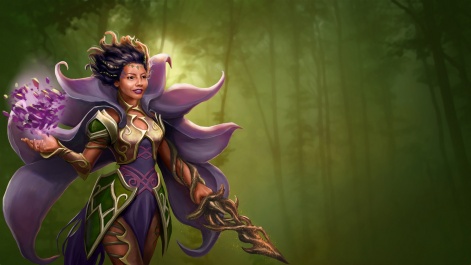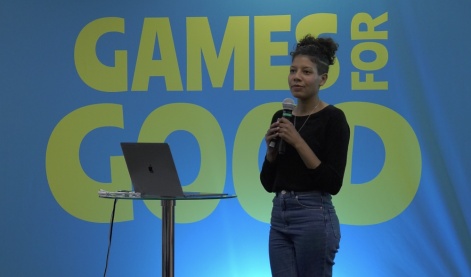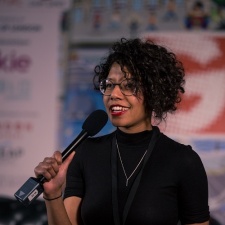We are in a pivotal moment. For decades, no matter the industry, people of colour have suffered through a lack of opportunity and a lack of respect, leaving them stuck playing second fiddle throughout their careers.
The games industry is no different, and here at PocketGamer.biz we wanted to do our part and help bring attention to the many incredible people of colour that help make up this sector. That is why we are committing to a new long-term regular feature to spotlight these people and their careers.
So, welcome to our new 'POC in Mobile' series, where discussion about finding a place in the games industry, the various challenges faced as a minority, and what truly needs to be done to make games more diverse will be the focal points of conversations.
This week, we spoke with Games for Good founder and former Space Ape Games head of content Deborah Mensah-Bonsu about why studios should be taking more risks to develop and tell more stories from different backgrounds.
PocketGamer.biz: Can you start off by telling us about your role in mobile games and what it entails?
Deborah Mensah-Bonsu: I was head of content at Space Ape up until about three months ago, which was a very varied role, largely by my own design. My hats included conceptualising, producing, and presenting video and live content; community management, marketing and PR as well as event and international project management.
There's no right way, and no one should feel discouraged from entering the industry because they think they come from the wrong professional backgroundDeborah Mensah-Bonsu
In my later years at Space Ape, I began pushing social impact initiatives, like our educational program Space Ape Varsity and fundraising partnerships. I continue to be part of our Green Team at Space Ape, which oversees our environmental and sustainability projects, including our work with UNEP's Playing for the Planet. All of this prompted me to start my own consultancy, helping studios and the wider industry to use games for good.
The proactive culture at Space Ape really taught me to look for gaps and problems and just start creating solutions. Working with that kind of freedom can be intimidating at first and then incredibly empowering. They turned me into an entrepreneur! Space Ape is now one of my clients, and I still lead on their social good initiatives. They're an absolutely incredible company that I'm glad to still be working with.
Why did you want to work in the mobile games industry?
I first started out in the industry at Xbox before moving into mobile games. I had been in the industry for about two years by then, originally hailing from a career in journalism. I was sought out by a recruiter and had heard good things about Space Ape specifically, so was keen to join.
All games and platforms have the potential to make positive change, but mobile games have an unrivalled potential when it comes to reaching the masses. We're starting to see the work of the Green Mobile Game Jam being implemented in some of the biggest titles, which is very exciting.
How would you recommend people get started in games? Any tools or literature you would advise?
There are a wealth of free programs and software available to practice and experiment with. Most pro tools have free versions for education, with Unity being just one example. East London Arts and Music, which is one of the coolest schools I have ever worked with, has just partnered with Playground and Xbox to put on free Unity workshops online.
My advice would be: just start creating. Joining game jams is also a great way to learn how to function well within a team and get a better understanding of what it takes to see a project through from start to finish. There are tons out there. For example, Ukie runs a student game jam twice a year, but there's also the Global Game Jam, which anyone can get involved in. I would also suggest finding out if your school has a Ukie student membership, and if not, ask if they'd be willing to join.

If you're more into other aspects of the industry such as community management, for example, then volunteering as a mod, creating content for your favourite games, or taking part in playtests is a good way to form relationships with developers. Studios are always grateful for knowledgeable evangelists of their titles. Also, attend industry events and join networking groups where you can meet peers and mentors.
What did you study (if anything) for your role? Are there any courses out there that you would advise for aspiring professionals?
I have a journalism degree and about seven years in that industry, which set me up with a ton of transferable skills in content, storytelling, production, and delivering to tight deadlines. It also taught me to be adaptable and pick up new things very quickly, which is an asset in an industry that moves and changes constantly.
There's an awakening taking place about the deep-seeded inequalities existing in all the systems that govern our societyDeborah Mensah-Bonsu
I actually think the games industry would benefit a great deal from engaging more diverse professional backgrounds. You're seeing a lot of that in the merging of games and TV/film already. I don't think there's a specific degree you need to have to flourish in this industry because we're comprised of so many varied disciplines. We did a Varsity series at Space Ape to showcase this - people had transitioned from finance to game lead, chef to programmer, air hostess to recruitment, and the list goes on.
There's no right way, and no one should feel discouraged from entering the industry because they think they come from the wrong professional background. If you're hungry, willing to teach yourself and work hard, that matters. I strongly believe that character is more important than skill set. Skills can be taught, but if you're working with someone with a terrible attitude it doesn't matter how talented they are.
What do you think should be done to improve diversity, not only across the games industry, but across all industries?
There's an awakening taking place about the deep-seeded inequalities existing in all the systems that govern our society. I don't pretend to be an expert in dismantling those systems. I think many of us are only now becoming conscious of and questioning why things are the way they are, while others have been fighting those injustices for years and are wondering what took everyone so long to wake up.
I think it takes everyone looking around their colleagues to see who's missing or not represented and challenging that. And for leadership to openly admit there is a problem, hearing from those affected about the impact that has on their work and their wellbeing.
With racism specifically, it's a very strange experience to be so very seen and so unseen at the same time. You can be picked out of a crowd in an instant, but your presence in important rooms can be ignored and make you feel invisible. Some forms of racism are overt, others are so subtle that if you were to describe them to someone who hasn't had the experience, they would think you're seeing things that aren't there or exaggerating.
The way we experience racism can also be very varied, even depending on the shade of black you are. We need to be able to take those subtleties into account. Another important thing is not expecting those in the minority to carry all the weight of bringing that change. It can be a weighty burden for anyone to become engaged in advocacy, so that burden needs to be shared equally. Plus, they may not even be in the room!
So, step one is getting them in the room. A part of that is recruiters doing the leg work to look outside of the normal pools and for the industry to bring in talent from other sectors, but it begins even earlier at the education level.
What are the biggest challenges you have encountered since joining the industry?
I also think we could all being doing a lot more to give young people a leg up through training, mentoring and work experience in our studiosDeborash Mensah-Bonsu
I'm used to being one of the few black people in my circle of friends and my workplace. My childhood growing up in Germany normalised that for me, which of course isn't necessarily a good thing. Those systems are so deep-rooted in all of us that we don't even realise how they're manifesting sometimes, even in ourselves. I think I had to overcome a lot of self-loathing ingrained in me as I was growing up.
You'll notice up until maybe five years ago most of the pictures circulating of me were ones where I had straight hair. Being mixed-race, I've had to do a lot of work to recognise my own privilege, but also learn to love the sides of me that society told me weren't good enough - like my curly hair, which I now absolutely love.
My greatest challenge in the industry was my own head to be honest. Imposter syndrome, feeling like I didn't belong or wasn't good enough. I'm pretty good at snuffing out that voice in most situations these days, though I also think it's quite natural for it to crop up whenever we take on a new challenge or step outside of our comfort zone. So now, if it comes up, it signals to me that I'm pushing myself and taking risks, and that's a good thing.
What do you think can be done to help encourage more people of colour to get into games?
As I mentioned above, I think we have to start much earlier to let young people know that a career in this industry is possible. I try to speak to students at all levels of their educational career, to let them know that someone who looks like me can be successful in this industry. It's hard to imagine a life where you don't see yourself represented.
Programs like Digital Schoolhouse have also been great at demonstrating the value of careers in games to teachers and students who might otherwise not have seen the industry as an option. I also think we could all being doing a lot more to give young people a leg up through training, mentoring and work experience in our studios.
Since the recent surge in the #BlackLivesMatters campaign, what changes (if any) have you seen from across the industry to address the issue?
There's a lot of movement now, which is encouraging. The people who are really trying to make a difference are getting the necessary platform to be seen so they can be supported through funding and partnerships in the industry - organisations like Code Coven, which provide programming boot camps to marginalised or underrepresented developers is an example.
Other examples are Coffee Stain expanding to funding racially diverse studios, or CAPY launching a mentorship program where black applicants are given priority.

More than that, I think studios need to be brave in telling different kinds of stories and to also make sure they have the right people to tell those stories. I recently got to interview Dr. Courtney Cogburn who created 1000 Cut Journey, a VR experience about racism. She said that good intentions are not enough and can sometimes do more harm than good when they are uninformed or lack relevant experience.
We need the right people at the table. I'm encouraged by titles like Tell Me Why from Dontnod Entertainment and Interior Night's As Dusk Falls, which I'm also consulting for and is backed by a diverse studio. What I've learned from Dr. Cogburn and those last two examples is that the process is often just as important as the outcome of the project.
What advice do you have for other people of colour that are looking at getting into games?
I think a lot of the same advice applies that I mentioned above, which I'd give to anyone looking to get into the industry. But also, to connect with advocacy groups like POC in Play, BAME in Games, and Code Coven. Thankfully, the number of spaces like those are increasing. Other advice, and again this applies to anyone, is to just start somewhere.
It doesn't have to be your dream job and what that is could change as you learn more, so keep an open mind. Getting your foot in the door is really important. And I always say this, but it's still true, what you do isn't as important as who you are. Let who you are define what you do, not the other way around.





















